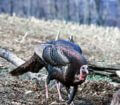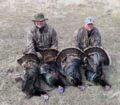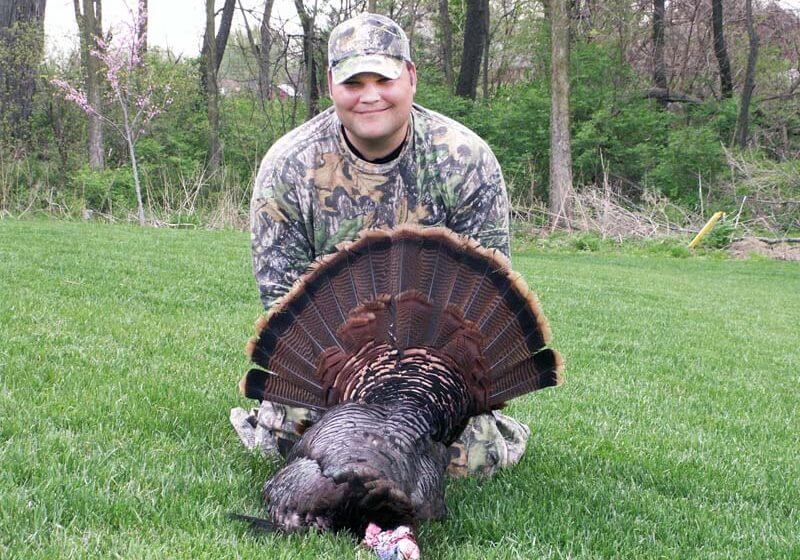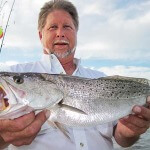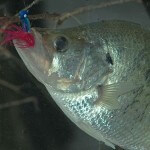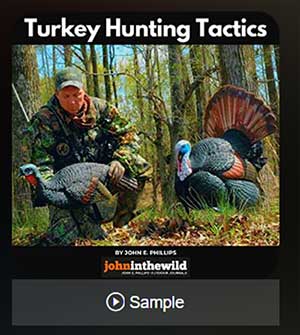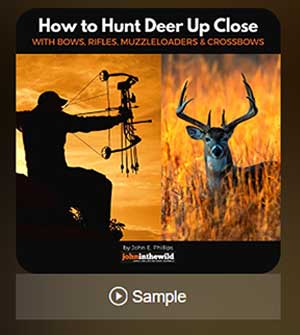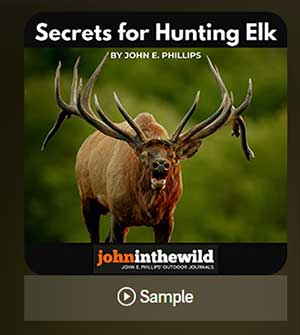Editor’s Note: Chris Phillips of Novi, Michigan has been chasing gobblers for 40+ years and hunts private land in five states. Over the years, he’s built a network of people who give him access to prime turkey-hunting property. He hunts about 5,000 acres in Nebraska, 12,000 in Mississippi, 10,000 in Kansas, 2,000 in Missouri and 2,000 in Michigan for a total of 31,000 acres.
 When I moved from Mississippi to Kansas (see Day 1), I spent an entire year trying to learn how to hunt Midwestern gobblers, because I have to hunt them so much differently than I do the turkeys in Mississippi. In Mississippi, if I use a decoy, I’ll only use only one Avian-X (www.avian-x.com) hen decoy. On the properties I hunt in Mississippi, if I put out a jake decoy or a strutting gobbler decoy on the edge of a field, then as soon as the gobbler flies out of the tree, lands in the field and sees one of those decoys, he’ll run back to the woods as fast as he can run. I’ve even seen them run away when I put out my single hen decoy.
When I moved from Mississippi to Kansas (see Day 1), I spent an entire year trying to learn how to hunt Midwestern gobblers, because I have to hunt them so much differently than I do the turkeys in Mississippi. In Mississippi, if I use a decoy, I’ll only use only one Avian-X (www.avian-x.com) hen decoy. On the properties I hunt in Mississippi, if I put out a jake decoy or a strutting gobbler decoy on the edge of a field, then as soon as the gobbler flies out of the tree, lands in the field and sees one of those decoys, he’ll run back to the woods as fast as he can run. I’ve even seen them run away when I put out my single hen decoy.
I only use light, soft turkey calls to try and call those birds. Mississippi toms usually will gobble a lot from the roost. But when they fly down, they often get a severe case of lockjaw. I only call just enough to make Mississippi gobblers curious. In the morning, I try to get as close as I possibly can to the spot where the gobbler usually flies down to when he leaves the roost. If I can’t take him there, I’ll head to the place where I think he’ll go after he leaves the field or after he leaves the hens he meets-up with first thing in the morning. I’ve been most successful taking gobblers in Mississippi between 10:00 am and noon than I have at any other times of the day. I try and use soft lost hen yelps, clucks, purrs and scratching in the leaves to call in those midmorning gobblers. I don’t anticipate hearing the turkey gobble when I set up between 10:00 am and noon. Most of the time, they’ll come in silent. I really depend more on my scouting ability than I do on my calling then.
 Whether I’m hunting an old turkey or a 2-year-old gobbler, I want to be invisible. In Mississippi, I wear Mossy Oak Obsession (https://www.mossyoak.com/camouflage/obsession), which I believe is the best southern pattern. Most years when turkey season arrives, most southern states already have had green-up. Mossy Oak Obsession allows me to blend in with the terrain where I’m hunting. If I’m hunting a 2-year-old gobbler during the first week of Mississippi’s turkey season, I often can put out a single Avian-X decoy and call him in right after he flies off the roost. But if I’m hunting an older gobbler, I rely more heavily on what I’ve learned scouting. I use what I call my sniper techniques to be at the spot where that older gobbler travels after he leaves his hens.
Whether I’m hunting an old turkey or a 2-year-old gobbler, I want to be invisible. In Mississippi, I wear Mossy Oak Obsession (https://www.mossyoak.com/camouflage/obsession), which I believe is the best southern pattern. Most years when turkey season arrives, most southern states already have had green-up. Mossy Oak Obsession allows me to blend in with the terrain where I’m hunting. If I’m hunting a 2-year-old gobbler during the first week of Mississippi’s turkey season, I often can put out a single Avian-X decoy and call him in right after he flies off the roost. But if I’m hunting an older gobbler, I rely more heavily on what I’ve learned scouting. I use what I call my sniper techniques to be at the spot where that older gobbler travels after he leaves his hens.
To learn more about turkey hunting, check out John E. Phillips’ print, Audible and Kindle turkey books at https://johninthewild.com/books/#turkey. For a free copy of John E. Phillips’ “The Turkey Gobbler Getter Manual,” go to https://johninthewild.com/free-books/.

